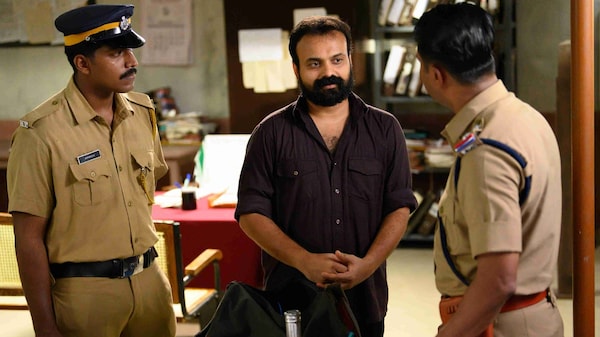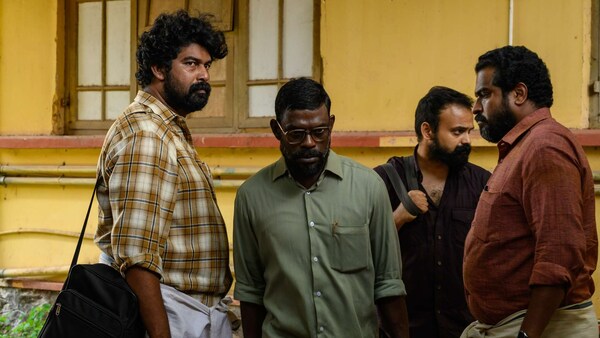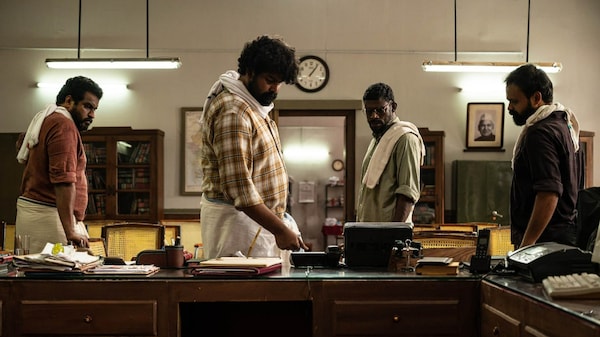Exclusive! Kunchacko Boban on Pada: The politics in my films is in showcasing the hard-hitting truth as it is
The Malayalam star talks about his recent socio-political thriller directed by Kamal KM that revolves around the 1996 hostage drama involving the members of the Ayyankali Pada, who demanded that the government should withdraw the amendment of the Kerala Scheduled Tribes Act 1975

Last Updated: 10.59 AM, Mar 15, 2022
Five years ago, when Kunchacko Boban turned 40, he said in an interview that he would change his criteria while selecting films. What that change has done is catapult him to a new rung in his career – one where he will be remembered for being part of movies that have informed and shaped social consciousness through cinema. If Martin Prakkat’s Nayattu last year laid bare the inner workings of the government, police and their machinery, director Kamal KM’s Pada, which released last week, serves as a stark reminder of the justice denied to the Adivasi communities even 25 years later after the government promised to restore the land that belonged to them.
In an exclusive interview with OTTplay, Kunchacko, who plays a member of the Ayyankali Pada who held the Palakkad collector hostage for about 10 hours in 1996, tells us about the relevance of Pada, its feedback and what went into creating the critically-acclaimed film and essaying the role.
The incident on which Pada is based happened in 1996, when you were in college and were gearing up for your acting debut. Did you hear about the incident then and what was the impression it had on you?
When this issue happened, I was in my second year in college. Back then, I wasn’t much bothered about the incident and didn’t understand its seriousness. I was enjoying my college days and to be frank I didn’t try to learn more about this incident either. It’s debatable how much a college student back then would get involved in such a social issue, but I wasn’t inclined to politics at that age.
In our previous interview, you said that humanity is your politics. Is that also the reason you connected deeply with Pada after Kamal KM's narration? Was there a particular aspect about the film that struck a chord with you?
The kind of politics that the films, which I have been part of, showcase is the hard-hitting truth that isn't altered. It’s either about incidents that are happening or have taken place. These aren’t showcased in a way to make it palatable, be it Nayattu or Pada. I am not the person who says that I support women and then do movies that go against my stand. If you look at Take Off, Ramante Edenthottam, How Old Are You? and even Bheemante Vazhi, you will understand that.
When Kamal told me the story of Pada, I was initially doubtful about the impact it would create in today’s atmosphere. But the role that he offered me was exciting. In the past when you do a movie about a collector being held hostage, the first thought would be to cast me as the bureaucrat. I also thought the same but he wanted me to play a member of the Ayyankali Pada. Also, after I read the script, he didn’t give me the copy of the script; instead, he passed me a book, Naxal Dinangal. He said it would help me journey with the character just as effectively as reading the script. So, the book helped me out a lot in playing Rakesh Kanhangad.

Kamal seems to have done extensive research for the movie, meeting the members of the Ayyankali Pada involved in the incident as well as collector WR Reddy and wife. As an actor, how much did it make your job easier?
The film’s co-producer CV Sarathi was the one who suggested to Kamal to make a film out of the incident in 1996. He said that the issue is still relevant and that there has not been a solution. Kamal understood that it’s a story that has to be told and ensured that he did thorough research and preparation for it. If Pada, which could have turned into a docu-fiction, has been showcased in the most entertaining manner to reach the audience, he deserves the entire credit for it. He precisely chose the right artistes and technicians and made use of them for the movie.
From giving me the book to how I had to deliver my dialogues that had revolutionary phrases, these are all from his mind. I could personally experience the impact these had in theatres. So, all credit goes to Kamal, who learnt about the incident, taught all of us about it too and executed it in the most brilliant way. He is a master craftsman.
Did you also get to learn more about the person you were playing and the problems that his community is still facing?
Yes, the book did give me a solid base and then while playing the character, I was able to journey with him. Also, while watching the film, especially the end clippings, you get to know how much the Adivasi communities are still being deprived of their rights. They are a minority and so most of the people in our society don’t really think about understanding their plight or changing their situation. But they are also people like us and they also have rights. They too should get justice, and I believe this movie has helped make this generation aware of that.
That’s the reason there hasn’t been a negative comment against the movie, because there’s a truth behind the story. It’s a relevant issue that is still unsolved. If people are watching Pada, feeling the thrill and emotions and calling out ‘Ayyankali Pada zindabad’ along with the characters, then I feel we have been able to get the issues faced by the communities to the larger audience with the film. The acceptance also proves that people are able to understand and empathise with the issues.

You share screen space with Joju George, Vinayakan, Dileesh Pothan, Shine Tom Chacko, Kani Kusruti and Prakash Raj in the film - all intense and brilliant performers on screen and yet fun people off it. How was the shooting vibe on the sets of Pada?
It simply was a dream come true to act with good actors, and that too with a huge line-up of them, from Joju, Indrans, Vinayakan, Dileesh, Shine, Kani, Unnimaya, Indrans, TG Ravi to Prakash Raj. Also, there are actors with theatre background such as Sudheer Karamana. In addition, the technicians too were all stellar talents – cinematographer Sameer Thahir, composer Vishnu Vijay and editor Shan Muhammed. The producers of the film – Mukesh R Mehta and Sarathi – too have always supported good cinema, and so working with the team always gave a positive vibe.
During the shoot too, one schedule was in Mar Athanasius College in Kothamangalam, where my wife Priya had studied. She and my son had visited the college during the shoot. I also used to go to the college to see her, without anyone knowing, when she was studying there. We strolled down the memory lane by visiting the canteen and other places we used to frequent.
All of us used to play cricket at the ground when we used to get time in between the shoot. It was fun and all four of us – Joju, Vinayakan, Dileesh and I – gelled well and that made the experience enjoyable.

 Premium
Premium